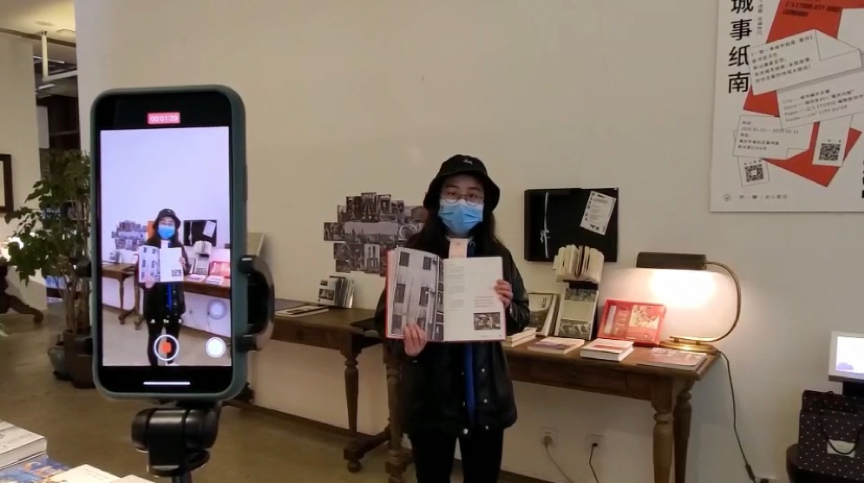03:08

Bookstores in China are resorting to online platforms as a solution with the impact of the COVID-19 pandemic, and their explorations in diversification have opened a new door in the pursuit of long run development.
China has approximately 70,000 bookstores, and most of them suspended business around January 20 when the coronavirus outbreak started in the country. The lengthy shutdown, undoubtedly, put them in a tough situation.
"The number of visitors reduced by 80 percent and the revenue shrank by 95 percent compared with the same period of last year," said Wang Minhui, marketing vice president of Yanjiyou, a bookstore chain with 62 locations nationwide. Few of its shops remain open during the pandemic.
During this special period of time, livestreaming, a new trend sweeping across China, has been the approach that many bookstores took to keep connected with their customers.

A New City Bookstore employee introduces books to viewers during a livestreaming session. Yang Jinghao/CGTN
A New City Bookstore employee introduces books to viewers during a livestreaming session. Yang Jinghao/CGTN
New City Bookstore, a brand created in southwestern Chinese city of Chongqing, held a livestreaming session each Friday, where they invited guests to read books, introduce new products and even taught viewers how to make coffee.
"We had planned to try something different. The pandemic has just quickened our pace of doing it. Our bookstore always values interaction with customers. We just hope we can accompany them in other ways during these different times," Xie Zhongmin, who is in charge of book purchasing and management, told CGTN.
The bookstore also developed online communities on social networking App WeChat, in which staff members initiate discussions on various topics and recommend books. Its two stores have resumed operations, with only a few visitors every day, but their WeChat groups are busy and lively.

Screenshot of a web shop opened by SiSYPHE, a bookstore chain with more than 200 locations across China. Yang Jinghao/CGTN
Screenshot of a web shop opened by SiSYPHE, a bookstore chain with more than 200 locations across China. Yang Jinghao/CGTN
Apart from strengthening bonds with readers through various online activities, many bookstores are also trying to explore new sales channels. SiSYPHE, which has more than 200 physical stores, opened 25 web shops in early February as an attempt to limit losses.
Almost at the same time, Yanjiyou started working with Eleme, one of the nation's largest food delivery platforms to improve logistical efficiency. Usually, products can be sent to customers within half an hour with this service.
"We hope such platforms deliver not just ordinary food, but also 'intellectual food'. Also, it expands our sales channels beyond the physical stores," said Wang of Yanjiyou. This practice has been followed by a growing number of bookstores.

An employee of a Yanjiyou bookstore hands over a book ordered by a customer to a food deliveryman. Yang Jinghao/CGTN
An employee of a Yanjiyou bookstore hands over a book ordered by a customer to a food deliveryman. Yang Jinghao/CGTN
Sharing short videos on popular platforms like Tik-tok has also been an option for many, where they recommend books or cultural and creative products in innovative ways. Many book lovers are happy to see these changes.
"Bookstores have made a lot of changes in recent years. Though some might not work for book lovers, they let us experience many different things. So I still welcome their new attempts," said Jiang Bing.
In fact, exploration during the outbreak has inspired many bookstores.
"Next, we will try more on different platforms besides book sharing, such as online reading activities or online courses to enrich our services," said Xie of New City Bookstore.
Wang said Yanjiyou will still focus on customer experiences at its stores in the future, but they will continue to further optimize their online services.
In recent years, physical bookstores in China have faced great challenges from e-commerce platforms, where books are sold with varying discounts. Many stores have tried to turn them into a comprehensive cultural space by providing multiple services to attract customers.
In response to the severe situation, many city governments have also issued preferential policies to support the development of bookstores, including providing subsidies.